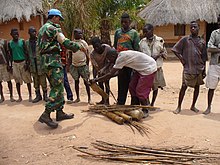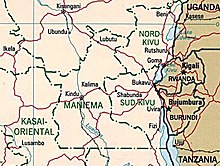Mai-Mai

The term Mai-Mai or Mayi-Mayi refers to any kind of community-based militia group active in the
Groups that fall under the umbrella term "Mai-Mai" include armed forces led by warlords, traditional tribal elders, village heads and politically motivated resistance fighters. Because Mai Mai have only the most tenuous internal cohesion, different Mai-Mai groups allied themselves with a variety of domestic and foreign government and guerrilla groups at different times. The term Mai-Mai refers not to any particular movement, affiliation or political objective but to a broad variety of groups.
The name comes from the Swahili word for water, "maji". Militia members sprinkle themselves with water to protect themselves from bullets.[1]
Mai-Mai were particularly active in the eastern Congolese provinces bordering Rwanda,
Mai-Mai in North and South Kivu

This section needs additional citations for verification. (April 2019) |
According to a 2001 UN report, 20,000 to 30,000 Mai-Mai were active in the two Kivu provinces. The two most powerful and well-organized Mai-Mai groups in the Kivus were led by Generals Padiri and Dunia. Currently most active is a group which is called Mai-Mai Yakutumba, was organized in 2007 by General Yakutumba. They were reported to have received aid from the government of the Democratic Republic of Congo and are widely viewed by other Mai Mai groups as the leaders, though not the commanders, of the Kivu Mai-Mai. A number of smaller Mai-Mai groups, such as the Mudundu 40/Front de Résistance et de Défense du Kivu (FRDKI) and Mouvement de Lutte contre l'Agression au Zaïre/Forces Unies de Résistance Nationale contre l'Agression de la Républíque Démocratique du Congo (MLAZ/FURNAC), were reported to cooperate with the Rwandan military and Rally for Congolese Democracy–Goma (RCD-Goma).
Walikale and Masisi north of Goma were the centres of Mai-Mai activity in North Kivu. In South Kivu, there have historically been concentrations around
A Mai-Mai leader, Colonel Mayele, was arrested by UN forces in October 2010, allegedly being the leader behind mass rapes in the Walikale region of North Kivu province.[2]
Mai-Mai in Katanga
A former leader of the Mai-Mai,
Other Mai-Mai groups
There was a large Mai-Mai presence in
Mai-Mai Gedeon is also commanded by Gedeon Kyungu Mutanga and loosely tied to his Mai-Mai Kata Katanga.[4] The Corak Kata Katanga also known as the Co-ordination for a Referendum on Self-determination for Katanga, composed mainly of former Katanga Tigers, a separatist group active in the 1960s.[4] They claim to be behind the attack on the Katanga airport in February 2011. It is unclear to what extent all these groups are co-ordinated.[4]
The
Mai-Mai in Virunga National Park
In May 2007, Mai-Mai killed two
Six Virunga Park Rangers were killed in an ambush and a seventh ranger was injured in the Central section of the reserve on 10 January 2021. Officials suspected the Mai-Mai to be behind the attacks.[7]
In June 2023, 7 Virunga Park Rangers were killed by local Mai-Mai in the span of 10 days. [8]
See also
- Resistance Patriots Maï-Maï
- Mai-Mai Kata Katanga
- Gédéon Kyungu Mutanga
References
- ^ E.F. Kisangani, S.F. Bobb, Historical Dictionary of the Democratic Republic of the Congo
- ^ Congo rebel chief arrested over mass rape – The Irish Times – Thu, Oct 07, 2010
- ^ "Kipushi : Kyungu Mutanga alias Gédéon condamné à la peine capitale". Radio Okapi. 6 March 2009. Retrieved 6 March 2009.
- ^ a b c d "Katanga: Fighting for DR Congo's cash cow to secede". bbcnews.com. 11 August 2013. Retrieved 12 September 2013.
- ^ a b c "DR Congo: Wanted Rebel's Troops Instill Fear". Human Rights Watch. 6 January 2015. Retrieved 6 April 2019.
- ^ WWF deeply saddened by death of Virunga park protectors (WWF article)
- ^ "Statement from Virunga National Park on recent attack". Virunga National Park. 10 January 2021. Retrieved 11 January 2021.
- ^ "Statement from Virunga National Park on recent attack". Virunga National Park. 16 June 2023. Retrieved 23 June 2023.
